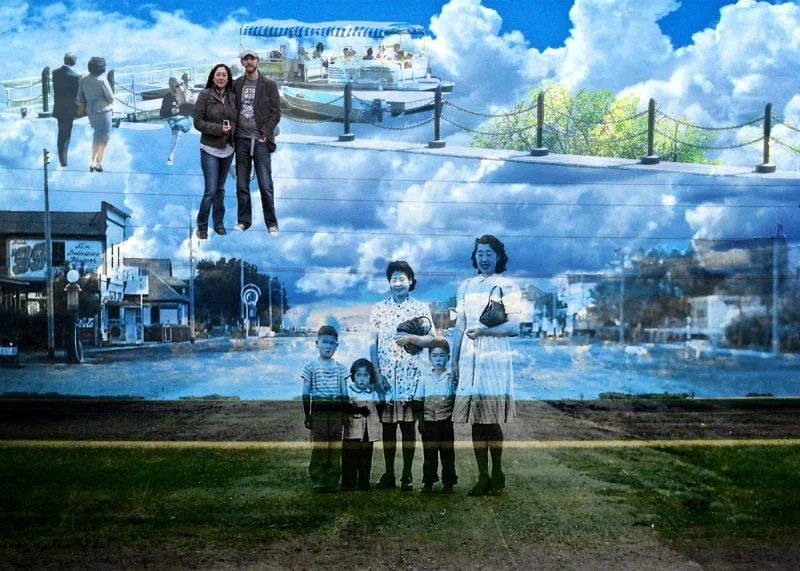
On our walls are several of Roy Miki’s collages, a medium he worked in following his retirement from SFU in 2007. They all engage poetic structures in the ways that Roy always brought to his writing: intelligence, playfulness, and innovation. My favourite is “Cloudy 7” (Flow: 510), Ste. Agathe, Manitoba. He and I talked frequently about this one, riffing on the complex notion of “remembering the future.” As part of his Clear and Cloudy series the collage juxtaposes a photo taken just before he was born, what he called the “back there” of his family’s confinement as “enemy aliens” in 1942 in Ste. Agathe, Manitoba and, looking down from above and in the clouds, a “future is now” photo of siblings. The archival photo in the centre of the collage, taken by his father — of his siblings, Art, Joan, and Les, his mother (pregnant with him), and a friend — is the first photo he included with his poems (Random Access File). The photo follows his poem “September 22,” the date in 1988 when Brian Mulroney delivered an apology to Japanese Canadians.
…
three years later
still rubbing eyes
in the tangled glaze
of rear view mirrors
in mutual need friendship’s
dream of receding mountains
rivers of baggage so many
voices caught in the rapids
…
Typical of our ongoing discourse around poetry, race, and history that started when Roy and I first met in the 1970s, the conversations we had about that collage and the notion of “remembering the future” encapsulate for me the dynamic exchange on poetics and the imagination he amplified. We found common ground in the poetry of bpNichol, Roy Kiyooka, and William Carlos Williams, and, concurrently, an even more crucial interest in the 80s/90s social housekeeping around redress, “writing thru race,” and the radicalization of identity. I felt sustained by his openness and curiosity that helped us share teaching and publishing. He became a major voice in the Writers’ Union and was crucial in helping to open that organization to include more writers of colour. For myself, and many others who benefitted from Roy’s intelligence and creativity, there is a sad chasm of bereftness. He brought a palpable sense of care and attention into matters urgent in our lifetime, all of which imbue the memory of the future with wonder and possibility. So much more to be remembered. As he ends the poem “September 22”:
“we” say what’s left
until all’s said
for the sake of story
in our telling times
Roy’s series of poems titled “Please” appears in The Capilano Review Issue 3.20 (Spring 2013), along with Louis Cabri’s interview with Roy, and Louis’s review of Roy’s Mannequin Rising, the book from which Roy reads in my video produced for the Parliamentary Poet Series “Poetry Connection” in 2012. Here Roy reads from his poem “A Walk on Granville Island” that probes its history. Entangled is the video of Roy by filmmaker Brian Johnson commissioned for the launch of The Capilano Review’s Pacific Poetries issue, Issue 3.26, in Spring 2015.
— Fred Wah
Roy Miki / Please
From Issue 3.20 (Spring 2013)
Roy Miki and Louis Cabri / “the coursing of staged crafts”: On poetry with Roy Miki
From Issue 3.20 (Spring 2013)
Roy Miki and Brian Johnson / Entangled
Film commissioned from Brian Johnson for the launch of Issue 3.26: Pacific Poetries (Spring 2015)
Fred Wah / Roy Miki reading from “A Walk on Granville Island”
Film by Fred Wah produced for the Parliamentary Poet Series “Poetry Connection” (2012)

